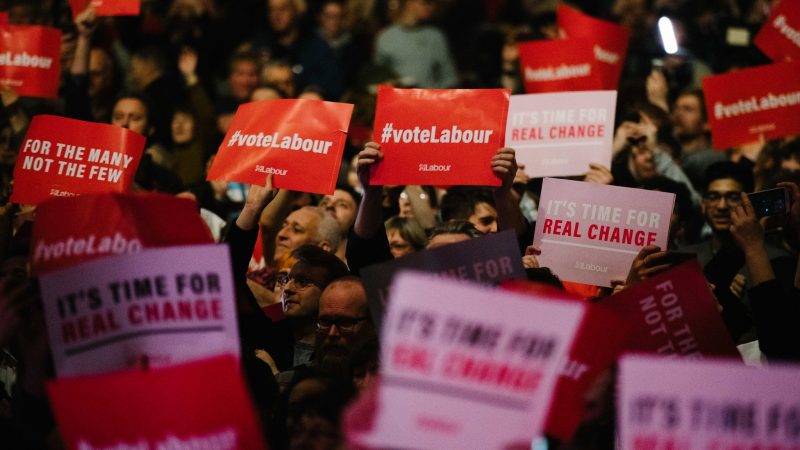
The nasty party is back. Liz Truss wanted to use Tory conference to launch her government – but instead her party showed its true colours. The party chairman kicked off the week, advising people struggling with higher bills and mortgages to “go out there and get that new job”. The Levelling Up Secretary prepared us for a new age of austerity by briefing the media that already-struggling departments would have to “trim the fat“. After the economic turmoil of recent weeks, ministers decided to reboot their relationship with business by cancelling meetings at the last minute or by simply not showing up. But, bleakest of all, was the Home Secretary setting out her “dream” of deporting desperate and vulnerable people to Rwanda.
The contrast with Labour’s conference could not have been more stark. In Liverpool, we set out an aspirational vision for our country and for families. It was a vision for those trying to do their best for themselves: affordable childcare; public transport that works; public services that are there when they need them; a secure and well-paid job; and a place to call home. The Labour Party knows that most British people are decent, kind and compassionate and will have been horrified by the sentiments expressed by the Conservative cabinet this week. The simple fact is that the Tories have inflicted over a decade of misery and hardship on the marginalised and on minorities.
It started with austerity. We all know how the austerity agenda has impacted on our communities, from the closure of the Sure Start centres and libraries that served as a lifeline to so many, to the withdrawal of the educational maintenance allowance (EMA) – which enabled young people to get to college and buy books and stationery – and the regressive benefits cap and two-child limit. Cuts to public services have impacted us all, but for those on lower incomes in Black and minority ethnic communities, austerity has been particularly devastating. Last week’s findings by the Runnymede Trust were particularly stark, showing that Black and minority ethnic people are 2.5 times more likely to be in relative poverty and 2.2 times more likely to be in deep poverty than their white counterparts.
Next came Brexit. As the Office for Budget Responsibility predicted: our economic growth has lagged our European counterparts; exports to the EU have plummeted, impacting businesses and jobs; and foreign direct investment has never recovered since its 2016-17 peak. Trade deals have failed to live up to their promise. All this has conspired to helped to create a bleak economic assessment and tough trading environment for businesses. Our labour market has undergone rapid change with migrant workers leaving the UK in wake of the referendum; zero-hours and agency contracts have been deployed in greater numbers, and wages have failed to increase in line with inflation. The TUC found that zero-hours workers earn less than a third of average workers, and that these contracts and are concentrated amongst those already facing disadvantage in the labour market: part-time workers, women, the young, Black and minority ethnic workers.
The inequalities underpinning our economy then thrived under Covid. Those who suffered the most were often those who were more likely to be living in over-crowded multi-generational households, those in unsecure work with zero-hours or temporary contracts that gave them no access to sick pay, and those who had to struggle to provide the space and technology needed to allow their children an education at home.
It’s been a tough 12 years under a Tory government – but the cost-of-living crisis, likely recession and further austerity will hit marginalised and minority communities even harder. The safety net has gone, and many people living in these communities are among the most exposed to the crisis that lies ahead of us. More than half of the UK’s Black children already live in poverty. Pakistani and Bangladeshi heritage workers have the lowest median hourly pay of any ethnic group, earning a fifth less than white British workers.
It will take a Labour government to tackle these problems and we must all work together to deliver one. In Liverpool, we demonstrated that we have a credible leadership and that the party is a government-in-waiting. Every day, our frontbenches in Westminster and Holyrood are forensically exposing the government’s weaknesses, while in the Senned and in local government we demonstrate the positive difference Labour makes to peoples’ lives. And from Constituency Labour Parties (CLPs) to the Stronger Together review, we are working together to develop bold Labour policies that appeal to the electorate and that can transform the lives of society’s most vulnerable.
When we win, it won’t be time for incremental evolution but bold transformative policies and programmes. We are the ones closest to the coalface, and it is those closest to the problems who know the solutions. We will pass a Race Equality Act, to tackle structural racism and dismantle the barriers standing in the way of ethnic minorities. We will do more to tackle the educational attainment gap. We need to invest in building social infrastructure in our communities and to transform public services. We will make it our mission to tackle inequalities wherever we find them.
The evidence is clear: 12 years of Tory government, under four Conservative Prime Ministers, has made life harder for ethnic minorities and for marginalised communities of all kinds. As is always the case, it will fall on Labour to clear up the mess left by the Tories. We have the leadership, the values and the policies that show that we’re ready to serve in government again. That Labour government must, and will, put these communities at the heart of its mission to transform our country for the better.




More from LabourList
‘Labour won’t stop the far right by changing leaders — only by proving what the left can deliver’
‘Cutting Welsh university funding would be economic vandalism, not reform’
Sadiq Khan signals he will stand for a fourth term as London Mayor